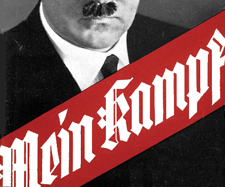On the Return of “Mein Kampf” to Germany

The copyright on Mein Kampf, Hitler’s infamous 700-page anti-Semitic rant, is scheduled to expire in 2015. Fearing an onslaught of neo-Nazi editions, the Bavarian state has decided to reprint the book in Germany for the first time since World War II, in a scholarly version they hope will be viewed as definitive. Whether or not you share their optimism, it’s impossible to deny the legitimacy of their decision. The de facto ban on the book has outlived its usefulness—if it had any to begin with.
Bad books should not be banned or burned but withered, through ridicule and contempt. Even the soft censorship of taboo grants Mein Kampf a power that exists nowhere in its ideas and writing. Better to drag the thing into the open air, where its fetid resentments can be ventilated by saner discourse. (One demonstration of this principle is the Internet, which has made the text available to Germans for years and which has yet to prompt a resurgence of the Third Reich.)
Mein Kampf is a sorry waste of bookshelf space, but in a free society it must be granted that space. The other books in the library have nothing to fear from it: quite the opposite. The works of Tadeusz Borowski and Art Spiegelman and Anne Frank render it as impotent by their testimony as it should have been from the moment of its publication. And so Bavaria has every right to reprint it, as long as the government fulfills its duty to expose the public to better works also. A free press and progressive school system will do more to keep Hitlerism at bay than any official expressions of disdain in the new edition. The cure for a bad book is a good book—and another, and another.
[Via Page Views. Image courtesy Wikipedia.]





